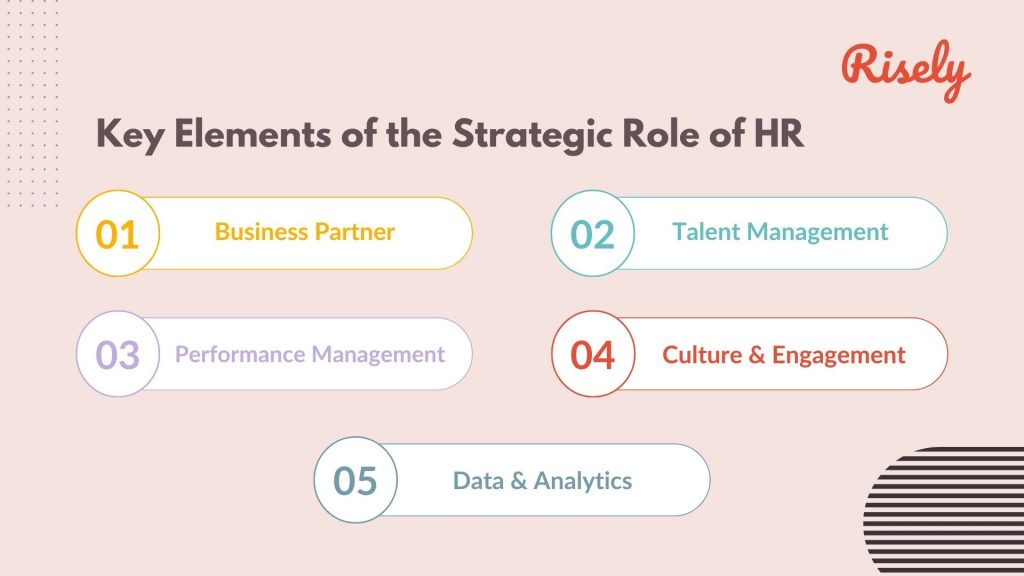Elevating Excellence: The Strategic Role of HR in Today’s Workplace
Gone are the days when HR was synonymous with paperwork, benefits administration, and office parties. The rapid evolution of the workplace, driven by globalization, technology, and shifting demographics, demands a new role for HR professionals. Today, they are strategic partners and architects of a dynamic employee experience, moving beyond administrative tasks to shape organizational success. In this blog, we’ll delve into the transformative journey of HR 2.0. We’ll uncover the strategic role of HR across talent management, performance evaluation, and employee engagement. From enhancing the bottom line to driving innovation, the strategic role of HR is no longer optional—it’s a necessity for organizations navigating change. Join us as we explore the “why” behind this shift and unlock the potential of the strategic role of HR in today’s fast-paced world of work.What is the Role of HR in an Organization?
In an organization, the role of HR, is multifaceted and pivotal to its success. At its core, HR is the primary link between the organization and its employees, overseeing various aspects of the employee lifecycle. From recruitment and onboarding to training and development, HR plays a crucial role in attracting, nurturing, and retaining talent. It ensures that the organization has the right people with the right skills in the right positions to achieve its goals effectively. Moreover, HR is responsible for maintaining a positive work environment and fostering employee engagement and development. This involves handling employee relations, managing performance evaluations, addressing grievances, and promoting diversity and inclusion. Ultimately, the role of HR extends far beyond administrative tasks; it is instrumental in shaping the organizational culture.The Traditional Role of HR and its Limitations
Let’s dive into the world of traditional HR and unpack its limitations. HR was primarily responsible for paperwork, policies, and procedures back then. It was all about compliance, record-keeping, and ensuring the organizational ship sailed smoothly. While paperwork is essential, it’s not the be-all and end-all of HR’s role. The traditional role of HR often shackled professionals to endless administrative tasks, leaving little room for innovation or strategic thinking. Think mountains of paperwork, manual data entry, and hours spent on routine tasks that could easily be automated. The biggest limitation of the traditional HR role is its lack of focus on people. HR is all about human resources, yet the administrative burden often overshadows the human element. Employee engagement, talent development, and fostering a positive workplace culture took a back seat to paperwork and compliance. And let’s face it—happy employees are the backbone of any successful organization. When HR is bogged down in administrative tasks, it’s tough to prioritize the people aspect of the job, leading to employee disengagement and dissatisfaction.Other Interesting Reads
Elevating HR: From Operational Support to Strategic Partner
Let’s shift gears from the limitations of traditional HR to the strategic and business-aligned functions that are reshaping the strategic role of HR. This transition represents a pivotal moment in HR history, empowering professionals to drive organizational success rather than being confined to administrative tasks. Strategic HR represents a shift from reactive to proactive practices, moving beyond paperwork to align HR initiatives with broader organizational goals. It’s about fostering innovation, cultivating a culture of excellence, and driving performance at every level. In today’s business environment, the value of HR in contributing to organizational goals cannot be overstated. Strategic HR professionals are crucial in attracting and retaining top talent, driving engagement, and maximizing organizational performance. They create environments where employees thrive and grow by addressing long-term human capital needs and nurturing leadership pipelines. Ultimately, the strategic role of HR isn’t just about processes—it’s about making a tangible impact on the bottom line. Organizations embracing strategic HR practices are better equipped to adapt, innovate, and achieve sustainable growth in competitive markets.
Key Elements of the Strategic Role of HR
The role of HR has evolved beyond its traditional administrative functions to become a strategic partner in organizational success. Let’s delve into the key elements that define the strategic role of HR:- Business Partner: Strategic HR professionals are integral business partners, collaborating closely with leadership to understand the organization’s strategic objectives and align HR strategies accordingly. HR can develop tailored initiatives that drive employee performance and engagement by gaining insights into business needs.
- Talent Management: Attracting, retaining, and developing top talent is central to the strategic role of HR. HR professionals employ various strategies, from comprehensive recruitment processes to robust talent development programs, to ensure that the organization has the right people in the right roles. They identify high-potential employees, nurture leadership pipelines, and create career pathways supporting individual growth and organizational objectives
- Performance Management: Effective performance management is crucial for aligning individual and team efforts with organizational goals. HR is pivotal in designing and implementing performance evaluation systems that provide meaningful feedback, foster continuous improvement, and recognize and reward achievements. HR helps drive accountability, motivation, and productivity across the organization by facilitating performance discussions and goal-setting processes.
- Culture & Engagement: HR is responsible for nurturing a positive, inclusive organizational culture that inspires employee engagement and commitment. The strategic role of HR professionals focuses on creating environments where employees feel valued, respected, and motivated to contribute their best work. They design employee recognition programs, wellness initiatives, and opportunities for feedback and collaboration to enhance morale, teamwork, and overall satisfaction.
- Data & Analytics: Data-driven decision-making is a cornerstone of strategic HR management. HR professionals leverage data and analytics to gain insights into workforce trends, identify areas for improvement, and measure the impact of HR initiatives. By analyzing key metrics such as employee turnover rates, engagement scores, and performance indicators, HR can identify patterns, anticipate challenges, and make informed decisions that drive organizational effectiveness and efficiency.
Challenges and Opportunities
Navigating the complex landscape of HR involves confronting various challenges while also capitalizing on emerging opportunities:- Adapting to Technological Advancements: As technology evolves rapidly, HR faces the challenge of integrating innovative tools and systems to streamline processes and enhance efficiency. Embracing digital transformation offers opportunities to automate repetitive tasks, leverage data analytics for informed decision-making, and improve employee experience. However, HR must also navigate potential pitfalls such as data privacy concerns and cybersecurity threats and ensure equitable access to technology across diverse employee populations.
- Navigating Through Global Workforce Trends: In an increasingly interconnected world, HR must navigate diverse workforce trends shaped by globalization, remote work, and demographic shifts. Managing a global workforce presents challenges related to cultural differences, legal compliance across jurisdictions, and ensuring effective communication and collaboration across borders. Moreover, the rise of remote and hybrid work arrangements introduces opportunities to tap into a broader talent pool, foster diversity, and promote work-life balance. HR plays a pivotal role in embracing these trends while addressing challenges related to talent management, performance evaluation, and employee engagement in a distributed work environment.
- Embracing Diversity and Inclusion Initiatives: Promoting diversity and inclusion (D&I) initiatives presents both a challenge and an opportunity for HR. While organizations recognize the importance of fostering diverse and inclusive workplaces, implementing effective D&I strategies requires a comprehensive approach. HR must address unconscious biases, promote inclusive hiring practices, and create equitable career advancement and professional development opportunities. However, you must navigate potential obstacles such as resistance to change, cultural barriers, and the need for ongoing education and training to foster an inclusive mindset across all levels of the organization.
Future of the Strategic Role of HR
As we gaze into the horizon of HR management, it’s clear that emerging trends and technologies are reshaping the landscape at an unprecedented pace. These innovations, from artificial intelligence (AI) to automation, are revolutionizing HR’s role in organizational success. AI-powered tools streamline recruitment processes, analyze candidate data to identify top talent, and even facilitate personalized learning and development programs. Automation optimizes administrative tasks, freeing HR professionals to focus on strategic initiatives that drive employee engagement and organizational growth. According to a recent report by Deloitte, 81% of HR leaders believe that AI will revolutionize talent acquisition, enabling faster and more accurate candidate assessments. However, amidst these technological advancements, one thing remains constant: the continuous need for HR to adapt and innovate to stay relevant and strategic.Conclusion
In today’s fast-paced business world, the strategic role of HR is crucial for innovation and organizational success. Beyond administrative tasks, HR drives engagement, diversity, and talent alignment. From tech adaptation to change leadership, strategic HR guides resilience and growth. Empowering the strategic role of HR is a must for thriving in a competitive market. Investing in HR as a partner unleashes human capital for innovation, productivity, and a competitive edge. It’s time to boost HR from support to a strategic force, using expertise to shape work’s future. Let’s embrace the strategic role of HR as a catalyst for positive change and lasting success.Test your skills now to become an effective and strategic HR!
Get detailed insights delivered straight to your inbox in just a few minutes.
Other Related Blogs
Know these 9 Basic Roles in Coaching as a Leader
In this blog, we will learn about the 9 essential roles in coaching that every L&D Leader should know to help team managers mentor, motivate and guide their team towards…
How Evidence-Based Coaching and Its Models Empower Leaders?
In this blog, we dive deep into what evidence-based coaching is, its core models and their implementation in an organization. … Read More
5 Unique Benefits Of Online Leadership Coaching
5 Unique Benefits Of Online Leadership Coaching Remember the days of leadership development being confined to a stuffy conference room filled with flipcharts and generic advice? Yeah, those days are…
5 Secrets To Ace Project Manager Training
5 Secrets To Ace Project Manager Training You’ve poured your heart and soul into building a dream team. You’ve recruited talented individuals with diverse skill sets, and you’re confident they…


